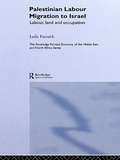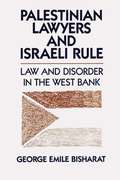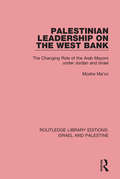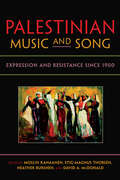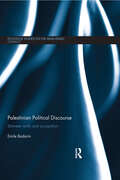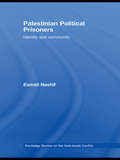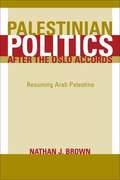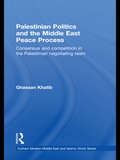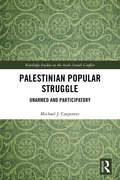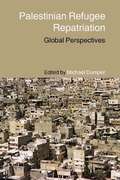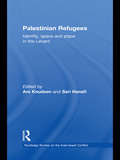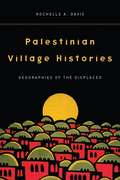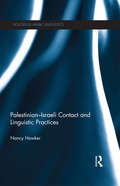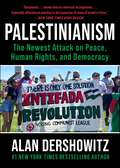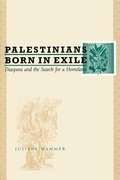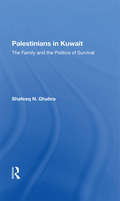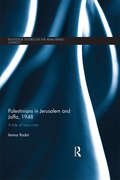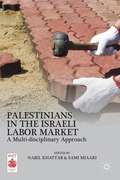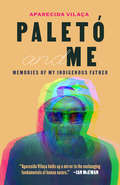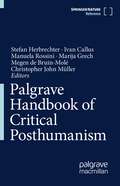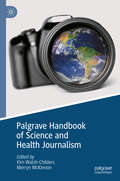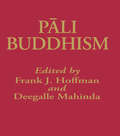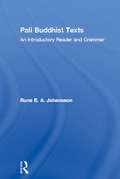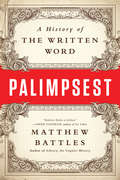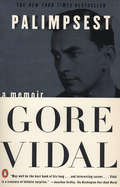- Table View
- List View
Palestinian Labour Migration to Israel: Labour, Land and Occupation (Routledge Political Economy of the Middle East and North Africa #Vol. 3)
by Leila FarsakhLeila Farsakh provides the first comprehensive analysis of the rise and fall of Palestinian labour flows to Israel. Highlighting the interdependence between Israel’s confiscation of Palestinian land and the use of Palestinian labour, she shows how migration has been the result of evolving dynamics of Israeli occupation and the reality of Palestinian labour force growth. This study analyzes the pattern of Palestinian labour supply, the role of Israel’s territorial and economic policies in the Occupied Territories in releasing Palestinian labour from the land, and the nature of Israeli demand for Palestinian workers, especially in the construction sector where the majority of commuting labourers are concentrated. New light is shed on the growth of illegal Israeli settlements in the West Bank and Gaza Strip, which are being built by Palestinian workers. Palestinian Labour Migration to Israel is original in its analysis of the contrasting forces of separation and the integration between Israel and the Palestinian territories, showing that the changing patterns in labour flows reflect a process of redefinition of the 1967 borders. It will be of valuable interest to economists and development specialists as well as to scholars, policy makers and all those concerned with the Palestinian-Israeli conflict.
Palestinian Lawyers and Israeli Rule: Law and Disorder in the West Bank
by George Emile BisharatAs frequent intermediaries between Israeli military authorities and Palestinian citizens, Palestinian lawyers stand close to the fault line dividing Israeli and Palestinian societies. The conflicts and tensions they experience in their profession mirror the larger conflicts between the two societies. Thus, as George Bisharat reveals in Palestinian Lawyers and Israeli Rule, a careful study of the work and lives of Palestinian lawyers ultimately helps to illuminate the causes of the intifada, or uprising, that began in December 1987. The study revolves around the central question of why the Palestinian legal profession declined during twenty years of Israeli occupation when, in other Third World countries, the legal profession has often reached its peak during a period of Western colonization. Bisharat answers this question with a wide-ranging inquiry into the historical origins of the legal profession and court system in Palestine, the tenuous grounding of these institutions in Palestinian society and culture, and the structure, style, and policies of the late-twentieth-century Israeli military government in the West Bank. For general readers interested in the Palestinian-Israeli conflict, as well as specialists in such fields as legal anthropology, sociology of the professions, Third World law and development, and Middle Eastern studies, Palestinian Lawyers and Israeli Rule will be required reading. As frequent intermediaries between Israeli military authorities and Palestinian citizens, Palestinian lawyers stand close to the fault line dividing Israeli and Palestinian societies. The conflicts and tensions they experience in their profession mirror the larger conflicts between the two societies. Thus, as George Bisharat reveals in Palestinian Lawyers and Israeli Rule, a careful study of the work and lives of Palestinian lawyers ultimately helps to illuminate the causes of the intifada, or uprising, that began in December 1987. The study revolves around the central question of why the Palestinian legal profession declined during twenty years of Israeli occupation when, in other Third World countries, the legal profession has often reached its peak during a period of Western colonization. Bisharat answers this question with a wide-ranging inquiry into the historical origins of the legal profession and court system in Palestine, the tenuous grounding of these institutions in Palestinian society and culture, and the structure, style, and policies of the late-twentieth-century Israeli military government in the West Bank. For general readers interested in the Palestinian-Israeli conflict, as well as specialists in such fields as legal anthropology, sociology of the professions, Third World law and development, and Middle Eastern studies, Palestinian Lawyers and Israeli Rule will be required reading.
Palestinian Leadership on the West Bank: The Changing Role of the Arab Mayors under Jordan and Israel (Routledge Library Editions: Israel and Palestine)
by Moshe MaozThe West Bank has for generations been the core area of the Palestinian-Arab community and of its national movement. Since 1967, it has become the main area of confrontation in the prolonged conflict between Palestinian-Arab and Jewish-Zionist nationalism. The Palestinian armed organization, the PLO – which has undertaken to lead the nationalist struggle of their people – was for long periods unable to operate on the West Bank because of strict security measures taken by the Jordanian and Israeli governments respectively. Consequently, the Palestinian mayors in the West Bank, who under Jordanian rule (1948-1967) had served as ruling instruments of the government, gradually became under Israeli control the political spokesmen of their communities. This book, first published in 1984, examines this remarkable change in the role of the West Bank Palestinian mayors, and their transformation since the early 1970s from conservative-moderate figures into radical-nationalist leaders. Against the background of the developing Palestinian and Israeli militant nationalism in the West Bank, the study analyses the complex relations between these new leaders and the governments of Israel and Jordan as well as the PLO command, until their final eviction by Israel in 1982.
Palestinian Music and Song: Expression And Resistance Since 1900 (Public Cultures Of The Middle East And North Africa Ser.)
by David A. Mcdonald Stig-Magnus Thorsén Heather Bursheh Moslih KanaanehDrawing from a long history of indigenous traditions and incorporating diverse influences of surrounding cultures, music in Palestine and among the millions of Palestinians in diaspora offers a unique window on cultural and political events of the past century. From the perspective of scholars, performers, composers, and activists, Palestinian Music and Song examines the many ways in which music has been a force of representation, nation building, and social action. From the turn of the 20th century, when Palestine became an exotic object of fascination for missionaries and scholars, to 21st-century transnational collaborations in hip hop and new media, this volume traces the conflicting dynamics of history and tradition, innovation and change, power and resistance.
Palestinian Political Discourse: Between Exile and Occupation (Routledge Studies on the Arab-Israeli Conflict)
by Emile BadarinA great deal of political and academic responses to the Israel/Palestine conflict have construed the Palestinians as an object of Western and Israeli discourses, rather than their own Palestinian discourse. This has hindered understanding of the internal mechanisms involved in the production of the Palestinian conditions. Palestinian Political Discourse presents an in-depth examination of Palestinian political discourse since an-Nakba in 1948 and stitches together the underlying mechanisms and rules that have shaped Palestinian politics, in turn synthesizing, interpreting and scrutinizing these rules. Studying the question of Palestine discursively offers new ways to rethink political agency, structures, identity, institutions and power relations while interpreting Palestinian actions. This book adds new understanding to Palestinian political agency by explaining how political actions were constructed. Discourse analysis methodology underlies the critical examination of the genealogy of concepts and frames that have oriented Palestinian political thought. Contrary to established views that ascribe shifts in Palestinian politics primarily to external factors and international changes, this book demonstrates how transformation has been a continuing inbuilt feature within the discursive regime and that dramatic shifts were only effects of much deeper, slowly evolving changes. Examining discourse, and thus language, offers an exceptional possibility to see from the Palestinian perspective. As such, this book provides material vital to the deeper interpretation of the Palestinian question. It will be a valuable resource for students and scholars of Israel-Palestine studies, Middle East studies, and discourse analysis.
Palestinian Political Prisoners: Identity and community (Routledge Studies on the Arab-Israeli Conflict)
by Esmail NashifSince the occupation of the West Bank and the Gaza Strip in 1967, more than a quarter of the Palestinians have been imprisoned by Israel on political grounds. This is the first major study that examines the community of Palestinian political prisoners in the Israeli prison system. Esmail Nashif explicates the processes that transformed this colonial system into a Palestinian generative site for constructing national, social, and cultural identities. Based on ethnographic, archival, and textual data, the book explores the material conditions of the prison, the education system, organizational structure, and the intellectual and aesthetic dimensions of the community’s building processes. Like other political prisoners in the late colonial era, in the Arab World, and South Africa, the Palestinian prisoners over-invested in meaning production and its related techniques of reading, writing and interpretation in order to regain their historical agency. This community came to be one of the major sites of the Palestinian national movement, and as such reshaped the realities of the Palestine/Israel conflict at many levels that challenged both the Palestinian national movement and the Israeli authorities. Theoretically grounded, well-written and illuminating, this book covers a field which is not very recurrent in the academic works and is certain to advance Palestinian scholarship substantially.
Palestinian Politics after the Oslo Accords: Resuming Arab Palestine
by Nathan J. BrownThis timely and critically important work does what hostilities in the Middle East have made nearly impossible: it offers a measured, internal perspective on Palestinian politics, viewing emerging political patterns from the Palestinian point of view rather than through the prism of the Arab-Israeli conflict.
Palestinian Politics and the Middle East Peace Process: Consensus and Competition in the Palestinian Negotiating Team (Durham Modern Middle East and Islamic World Series)
by Ghassan KhatibEight years after the second Palestinian uprising, the Oslo accords signed in 1993 seem to have failed. The reasons for the failure continue to fascinate students, politicians, researchers and policymakers alike. This book explores one of the major aspects of the bilateral peace process – the composition and behaviour of the Palestinian negotiating team, which deeply impacted the outcome of the negotiations between 1991 and 1997. It focuses on the dynamics between the PLO leadership outside the occupied Palestinian territories and the grassroots leadership within the areas under Israeli control that led to conflicts of interest at the time of the final agreement. As the author was a part of the Palestinian leadership in the occupied territories, and was present during the negotiations process in Madrid and Washington DC, the book contains original, unpublished accounts, including those of the Washington bilateral negotiations and crucial internal Palestinian meetings. It is an excellent resource to gain an understanding of Palestinian behavior during peace talks, deterioration in peace-making efforts, the resulting radicalization, and the growing tendency towards violence.
Palestinian Popular Struggle: Unarmed and Participatory (Routledge Studies on the Arab-Israeli Conflict)
by Michael J. CarpenterPalestinian Popular Struggle challenges conventional thinking about political action and organization. It offers an alternative to the seemingly failed tracks of armed struggle and diplomatic negotiations. A discourse of rights and global justice helps bridge national and religious divides, drawing Jewish Israelis and diverse supporters from around the world to participate in direct-action campaigns on the ground in the West Bank. The movement has some important achievements and continues to offer innovative approaches to the Israeli–Palestinian conflict. This book summarizes Palestinian traditions of popular struggle and presents original field research from the West Bank, drawing on several months of participant observation, over twenty-five hours of recorded interviews with Palestinian activists, and more than 200 questionnaires gaging public perceptions about the strategies of the popular committees. One of the book’s major case studies is the village of Nabi Saleh, which recently became well known when one of its activists, a sixteen-year-old girl named Ahed Tamimi, was imprisoned for slapping Israeli soldiers outside her family home. The book offers insight into new waves of Palestinian popular protest, from the 2017 prayer protests in Jerusalem to the 2018 march of return in Gaza. Palestinian Popular Struggle is a valuable resource for researchers and students interested in War and Conflict Studies, Politics and the Middle East.
Palestinian Refugee Repatriation: Global Perspectives (Routledge Studies in Middle Eastern Politics)
by Michael DumperThe repatriation of Palestinians is a highly topical issue, and a critical component of any future peace process for Israel/Palestine. Until now, the mechanics of repatriation have not been dealt with in detail. This book explores the notion that the Palestinian refugee case is exceptional through the comparative study of refugee repatriation, and asks: To what extent can the Palestinian case be said to be unique? Where are the divergences, the overlaps and points of similarity with other refugee situations? What lessons can be drawn from these comparisons? How can these lessons inform refugee organizations, the donor community and policy makers? The expert contributors examine the contextual and methodological field, reviewing the trends in forced migration and refugee studies as well as studying the historical and political background of UNHCR and the negotiations around the Palestinian refugee issue. Taking a comparative approach, the book incorporates case studies of specific refugee situations from around the world, revealing key issues in the formulation of repatriation programmes and highlighting lessons to be learnt.
Palestinian Refugees: Identity, Space and Place in the Levant (Routledge Studies on the Arab-Israeli Conflict)
by Are KnudsenMore than four million Palestinian refugees live in protracted exile across the Middle East. Taking a regional approach to Palestinian refugee exile and alienation across the Levant, this book proposes a new understanding of the spatial and political dimensions of refugee camps across the Middle East. Combining critical scholarship with ethnographic insight, the essays uncover host states’ marginalisation of stateless refugees and shed light on new terminology on refugees, migration and diaspora studies. The impact on the refugee community is detailed in novel studies of refugee identity, memory and practice and new legal approaches to compensation and "right of return". The book opens a critical debate on key concepts and proposes a new understanding of the spatial and political dimensions of refugee camps, better understood as laboratories of Palestinian society and "state-in-making". This strong collection of original essays is an essential resource for scholars and students in refugee studies, forced migration, disaster studies, legal anthropology, urban studies, international law and Middle East history.
Palestinian Village Histories: Geographies of the Displaced
by Rochelle A. DavisThroughout modern-day Israel, over four hundred Palestinian villages were depopulated in the 1947-1949 war. With houses mostly destroyed, mosques and churches put to other uses, and cemeteries plowed under, Palestinian communities were left geographically dispossessed. Palestinians have since carried their village names, memories, and possessions with them into the diaspora, transforming their lost past into local histories in the form of "village memorial books". Numbering more than 100 volumes in print, these books recount family histories, cultural traditions, and the details of village life, revealing Palestinian history through the eyes of Palestinians. Through a close examination of these books and other commemorative activities,Palestinian Village Historiesreveals how history is written, recorded, and contested, as well as the roles that Palestinian conceptions of their past play in contemporary life. Moving beyond the grand narratives of 20th century political struggles, this book analyzes individual and collective historical accounts of everyday life in pre-1948 Palestinian villages as composed today from the perspectives of these long-term refugees.
Palestinian-Israeli Contact and Linguistic Practices (Routledge Arabic Linguistics Series)
by Nancy HawkerOffering insight into linguistic practices resulting from different kinds of Palestinian-Israeli contact, this book examines a specific conceptualisation of the link between the political and economic contexts and human practices, or between structure and agency, termed "articulation". The contexts of the military occupation, a shared consumer market, controlled cheap labour migration, and the provision of social services, supply the setting for power relations between Israelis and Palestinians which give rise to a variety of linguistic practices. Among these practices is the borrowing of Hebrew words and phrases for use in Palestinians’ Arabic speech. Hebrew borrowings can demarcate in-groups, signal aspirations to a modern lifestyle, and give a political edge to humour. Nancy Hawker’s explanation for these practices moves away from the notions of conflict and national identity and gives prominence to Palestinian and Israeli ideologies that inform the conceptual experience of Palestinians. Addressing an understudied linguistic situation, Palestinian-Israeli Contact and Linguistic Practices brings us documentation and analysis of recent casework, firmly anchored in empirical results from fieldwork in three refugee camps in the Occupied Palestinian Territories. Combining sociolinguistics with politics, economics, sociology and philosophy this book will be of great interest to students and scholars of Middle East Studies, Linguistics and Political Theory.
Palestinianism: The Newest Attack on Peace, Human Rights, and Democracy
by Alan DershowitzPalestinianism is not only the newest manifestation of anti-Semitism; it also poses grave threats to peace, human rights, and democratic values. Its dangers must be exposed and challenged in the marketplace of ideas. It is the purpose of this book to pose that challenge and to put Palestinianism on trial for the moral crimes of bigotry, incitement to violence, and destroying any prospects for peace. By &“Palestinianism,&” Alan Dershowitz does not mean merely supporting a Palestinian state or the rights and well-being of the Palestinian people. Those are entirely reasonable positions to take. He means only the obsessive focus on the claims of Palestinians and their supporters—to the exclusion or minimization of the claims of other, more deserving, groups. This singular focus on the &“rights&” of Palestinians is coupled with an equivalent singular focus on the alleged &“wrongs&” of only one country—Israel, the nation-state of the Jewish people. It is the coupling of these biases that constitutes the new &“Palestinianism&” that we are now experiencing on university campuses, in international organizations, among hard-left politicians, and in many media. In Palestinianism, Dershowitz explores the sources of contemporary Jew-hatred, Israel demonization, and other threats to Jewish communities around the world. He demonstrates why he believes things are likely to get worse, as they did in Germany during the late 1930s. He does not believe they will culminate in another genocidal holocaust but that when the young bigots who so fervently rally behind Palestinianism grow into influential adults, they will increase the hatred against Jews and their nation-state. He argues that Jews and their state must become more self-reliant, and less dependent on the approval, support, or selection by others.
Palestinians Born in Exile: Diaspora and the Search for a Homeland
by Juliane HammerIn the decade following the 1993 Oslo Peace Accords, some 100,000 diasporic Palestinians returned to the West Bank and Gaza. <P><P>Among them were children and young adults who were born in exile and whose sense of Palestinian identity was shaped not by lived experience but rather through the transmission and re-creation of memories, images, and history. As a result, "returning" to the homeland that had never actually been their home presented challenges and disappointments for these young Palestinians, who found their lifeways and values sometimes at odds with those of their new neighbors in the West Bank and Gaza.
Palestinians In Kuwait: The Family And The Politics Of Survival
by Shafeeq N GhabraThe research, field work and writing for this study have taken over two years. The book was originally written as a Ph.D. dissertation under the supervision of Professor James Bill of the University of Texas (at Austin). I am grateful to him for his careful and considerate attention to the manuscript at its several stages. I wish to thank Professor Henry Dietz, Robert Femea, Lawrence Graham, and Robert Hardgrave, who provided important suggestions for the writing of this study. Four more individuals deserve particular mention for their contribution to the writing of the book. Dr. Barbara Harlow who took time to read the entire manuscript and Dr. Michael Fischer who read part. I thank both of them for the valuable suggestions provided to me. I wish to express my gratitude to Dr. Ghassan Salame of the American University of Beirut whose support encouraged me to turn my Ph.D. dissertation into a book. Finally, I would like to thank Barbara Ellington, senior acquisition editor of W estview Press, for her support
Palestinians in Jerusalem and Jaffa, 1948: A Tale of Two Cities (Routledge Studies on the Arab-Israeli Conflict)
by Itamar RadaiBetween November 1947 and May 1948 war between the Palestinian Arab community and the Jewish community encompassed Palestine, with Jerusalem and Jaffa becoming focal points in the conflict due to their centrality, size and symbolic importance. Palestinians in Jerusalem and Jaffa, 1948 examines Palestinian Arab society, institutions, and fighters in Jerusalem and Jaffa during the conflict. It is one of the first books in English that deals with the Palestinian Arabs at this crucial and tragic moment in their history, with extensive use of Arabic sources and an inquiry from the Palestinian vantage point. It examines the causes of the social collapse of the Palestinian Arab communities in Jerusalem and Jaffa during the 1948 inter-communal war, and the impact of this collapse on the military defeat. This book reveals that the most important internal factors to the Palestinian defeat were the social changes that took place in Arab society during the British Mandate, namely internal migration from rural areas to the cities, the shift from agriculture to wage labour, and the rise of the urban middle class. By looking beyond the well-established external factors, this study uncovers how modernity led to a breakdown within Palestinian Arab society, widening social fissures without producing effective institutions, and thus alienating social classes both from each other and from the leadership. With careful examination of a range of sources and informed analysis of Palestinian social history, Palestinians in Jerusalem and Jaffa, 1948 is a key resource for students and scholars interested in the modern Middle East, Palestinian Studies, the Arab-Israeli conflict and Israel Studies.
Palestinians in the Israeli Labor Market
by Nabil Khattab Sami MiaariBringing together important contributions from leading Israeli Jewish and Palestinian scholars, this comprehensive and multi-disciplinary volume addresses the most recent developments and outcomes of the labor market integration of the Palestinian minority inside Israel.
Paletó and Me: Memories of My Indigenous Father
by Aparecida VilaçaWinner of the prestigious Casa de las Américas Prize, this work spins a heartfelt story of an improbable relationship between an anthropologist and her charismatic Indigenous father. When Aparecida Vilaça first traveled down the remote Negro River in Amazonia, she expected to come back with notebooks and tapes full of observations about the Indigenous Wari' people—but not with a new father. In Paletó and Me, Vilaça shares her life with her adoptive Wari' family, and the profound personal transformations involved in becoming kin. Paletó—unfailingly charming, always prepared with a joke—shines with life in Vilaça's account of their unusual father-daughter relationship. Paletó was many things: he was a survivor, who lived through the arrival of violent invaders and diseases. He was a leader, who taught through laughter and care, spoke softly, yet was always ready to jump into the unknown. He could shift seamlessly between the roles of the observer and the observed, and in his visits to Rio de Janeiro, deconstructs urban social conventions with ease and wit. Begun the day after Paletó's death at the age of 85, Paletó and Me is a celebration of life, weaving together the author's own memories of learning the lifeways of Indigenous Amazonia with her father's testimony to Wari' persistence in the face of colonization. Speaking from the heart as both anthropologist and daughter, Vilaça offers an intimate look at Indigenous lives in Brazil over nearly a century.
Palgrave Handbook of Critical Posthumanism
by Manuela Rossini Stefan Herbrechter Ivan Callus Marija Grech Megen de Bruin-Molé Christopher John MüllerPalgrave Handbook of Critical Posthumanism is a major reference work on the paradigm emerging from the challenges to humanism, humanity, and the human posed by the erosion of the traditional demarcations between the human and nonhuman. This handbook surveys and speculates on the ways in which the posthumanist paradigm emerged, transformed, and might further develop across the humanities. With its focus on the posthuman as a figure, on posthumanism as a social discourse, and on posthumanisation as an on-going historical and ontological process, the volume highlights the relationship between the humanities and sciences. The essays engage with posthumanism in connection with subfields like the environmental humanities, health humanities, animal studies, and disability studies. The book also traces the historical representations and understanding of posthumanism across time. Additionally, the contributions address genre and forms such as autobiography, games, art, film, museums, and topics such as climate change, speciesism, anthropocentrism, and biopolitics to name a few. This handbook considers posthumanism’s impact across disciplines and areas of study.
Palgrave Handbook of Science and Health Journalism
by Kim Walsh-Childers Merryn McKinnonThis handbook reviews the extant literature on the most important issues in health and science journalism, with a focus on summarizing the relevant research and identifying key questions that are yet to be answered. It explores challenges and best practices in health and science reporting, formats and audiences, key topics such as climate change, pandemics and space science, and the ethics and political impacts of science and health journalist practice. With numerous international contributions, it provides a comprehensive overview of an emerging area of journalism studies and science communication.
Pali Buddhism
by Frank Hoffman Deegalle MahindaThis is an interdisciplinary and holistic survey of Pali Buddhism, covering philological, indigenous and philosophical approaches in a single volume.The work is divided into three main sections: Philological Foundations; Insiders' Understandings; and Philosophical Implications.
Pali Buddhist Texts: An Introductory Reader and Grammar
by Rune E. JohanssonPali is one of the Middle Indian idioms and the classical language of Theravada Buddhism. It is therefore important both to linguists and students of Buddhism. This introductory book centres on a collection of original texts, each selected as an especially important and beautiful formulation of a Buddhist idea. By means of a vocabulary, translation and commentary, each text is explained so concretely that it can be read with little preparation. Detailed explanations are provided for the many technical terms, which have frustrated so many western explorers of Buddhism. For reference, a grammar is provided. Sanskrit parallels to many of the words are given, as well as a special chapter comparing the two languages.
Palimpsest: A History of the Written Word
by Matthew BattlesA profound, eloquent meditation on the history of writing, from Mesopotamia to multimedia. Why does writing exist? What does it mean to those who write? Born from the interplay of natural and cultural history, the seemingly magical act of writing has continually expanded our consciousness. Portrayed in mythology as either a gift from heroes or a curse from the gods, it has been used as both an instrument of power and a channel of the divine; a means of social bonding and of individual self-definition. Now, as the revolution once wrought by the printed word gives way to the digital age, many fear that the art of writing, and the nuanced thinking nurtured by writing, are under threat. But writing itself, despite striving for permanence, is always in the midst of growth and transfiguration. Celebrating the impulse to record, invent, and make one's mark, Matthew Battles reenchants the written word for all those susceptible to the power and beauty of writing in all of its forms.
Palimpsest: A Memoir (Primera Persona Ser.)
by Gore VidalThis explosively entertaining memoir abounds in gossip, satire, historical apercus, and trenchant observations. Vidal's compelling narrative weaves back and forth in time, providing a whole view of the author's celebrated life, from his birth in 1925 to today, and features a cast of memorable characters—including the Kennedy family, Marlon Brando, Anais Nin, and Eleanor Roosevelt.
